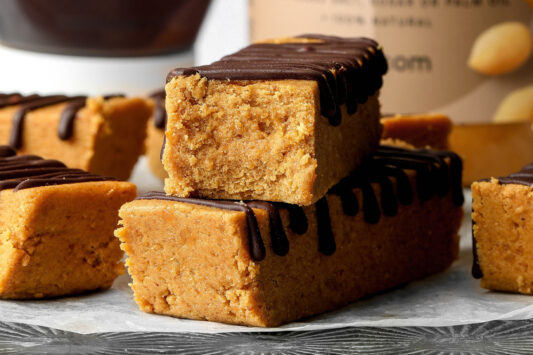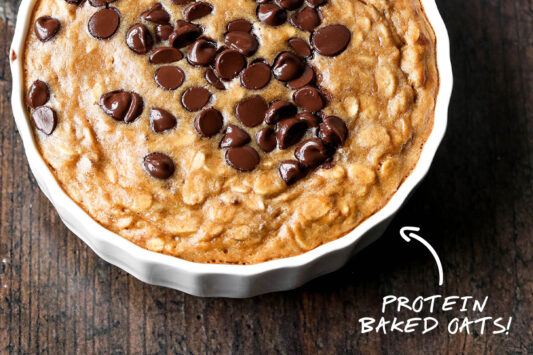It is quite common for many people to avoid carbohydrates in their diet due to a multitude of reasons, from weight loss to controlling blood sugar levels, but are they really that bad when taken in the correct ways? And are all carbohydrates classed the same? Are carbs bad for you?
As well as being the body’s main source of energy, carbohydrates play a vital role in recovery, athletic performance, and reducing fatigue. With all this in mind, there’s an obvious reason why there is so much confusion over this nutrient.
IS A CARB A CARB?
Introducing: Complex and Simple Carbs
For many years carbohydrates were traditionally categorised into either simple (fast-release carbohydrates) or complex (slow-release carbohydrates), based on the number of monosaccharide units linked together, as well as the total fibre content of the food. The general consensus was that simple carbohydrates would provide a rapid rise in blood sugar compared to complex carbohydrates.
But did you know that this doesn’t always hold true? A good example of this is fructose. It is often classed as a simple carbohydrate but because it is broken down in the liver before entering the blood, it doesn’t actually give a rapid increase in blood sugar.
As a result, Glycemic Index (commonly known as GI) was determined as a more suitable method of categorising carbohydrates due to the fact that it takes into consideration the rate of absorption into the blood and subsequent effects on insulin levels.
USING THE GLYCEMIC INDEX (GI)
Glycemic Index (GI) is a measurement of a food’s effect on blood glucose levels and was originally developed to help patients with diabetes to control their blood sugar levels. It later became a useful tool by athletes for performance and by the general public to control body fat levels.
Foods are usually classified as being high, moderate or low GI on a scale of 0-100. The general consensus was that Higher GI carbohydrates are preferred for performance whereas lower GI are better for fat loss and general health and well-being.
- High GI – above 70 (potato, white bread, bagels)
- Moderate GI – 55 to 70 (basmati rice, oats, sweet potatoes)
- Low GI – below 55 (beans, berries, quinoa, honey)
WHEN IS THE BEST TIME TO HAVE CARBS AND WHAT TYPE IS THE BEST?
CARBOHYDRATES PRE-WORKOUT
The late 1960s saw the emergence of carbohydrate loading strategies for improving exercise performance – arrive in a high carbohydrate state, and ultimately have more energy available to perform better.
However, before jumping the gun here, it is important to consider the context of why you want to carb load and if the sport you are participating in requires you to be loaded or not. For example, resistance-based training would not require the same level of fuelling compared to endurance events such as a marathon where the energy expenditure is greater. Current recommendations for optimal performance and pre-carbohydrate feeding are explained below:
- Carbohydrate loading preparing for events up to 90 min high-intensity exercise – 7-12 g/kg body mass per 24 hours leading to the event.
- Carbohydrate loading preparing for events greater than 90 min of sustained intermittent exercise –10-12 g/kg body mass per 24 hours for 2 days leading to the event.
- Pre-event fuelling before high-intensity exercise less than 60 min – 1-4g/kg body mass 1-4 h before exercise.
- Pre-fuelling for resistance-based exercise – low GI carbs (1g/kg body weight) are preferred. If the goal is fat loss then lower carb is better.
CARBOHYDRATES DURING EXERCISE
Carbohydrate feeding during exercise can support glycogen resynthesis, improve motor function and enhance performance but the amount and type of carbs are, again, highly dependent on the type of exercise. Therefore, it is essential to find out what the goal of the exercise session or workout is beforehand.
- Exercise less than 30 min – if the exercise duration is less than 30 minutes, there are no benefits of taking any additional carbohydrates.
- Exercise 45-90 minutes – when exercise is ‘full-out’ e.g. a football match, performance will benefit from additional carbs. Research shows that even carbohydrate mouth rinse can improve performance.
- Prolonged exercise – for exercise lasting 1-2 hours carbs have been shown to improve performance (30g / hr is sufficient). When duration increases it is recommended to increase the amount of carbs (60-90g / hr), as long as it doesn’t affect gastrointestinal distress. Greater carbohydrate oxidation can occur through mixes of different types of carbs (glucose + fructose / 2:1 ratio).
- If the goal is fat loss during your sessions rather than performance, the recommendation is to avoid carbohydrates (particularly high GI).
CARBOHYDRATES POST-WORKOUT
The use of carbs post-workout can have huge effects on your outcome of recovery and performance. The first way is that carbs (particularly high GI) can stimulate an insulin response which in turn increases the amount of glucose taken up by your muscle cells. Here the muscle membranes are more permeable to glucose so they can take up more glucose than usual.
With this in mind, it’s suggested to consume moderate to high GI foods in the first 2 hours post-exercise to increase glycogen replenishment and then revert back to low GI foods 24 hrs post-exercise.
Insulin also has a second major function in the body which makes it important for strength and conditioning. As well as facilitating the storage of glucose, insulin is one of the body’s anabolic hormones – meaning once it binds with its receptors it will activate protein synthesis whilst also preventing protein breakdown. In other words, it has the ability to promote muscle growth and therefore, the control of insulin through dietary carbohydrates is extremely important following resistant training.
KEY TAKEAWAY
Carbohydrates are clearly an important part of the diet, particularly for energy and performance but it goes without saying that people should pay particular attention when looking at their carbohydrate intake across the day.
Carbohydrates differ from one another and the types, timing and amount of carbs around training and throughout the day should be carefully considered in order to maximise performance (either endurance or resistance based), help reduce body fat, and support general health.
CARBOHYDRATES: PRACTICAL RECOMMENDATIONS
- The majority of carbs for everyday consumption should come from low GI.
- Try to avoid late-night high-GI snacks and choose low-GI.
- Base your pre, and intra-exercise carb intake on the type, intensity and duration of the sport/exercise.
- Focus on medium to high GI carbs immediately after endurance-based training to optimise the replenishment of muscle glycogen.
- Try to include medium to high GI foods immediately after resistance training to promote muscle protein synthesis and prevent muscle protein degradation – this should be with approximately 20g of high-quality protein to maximise net protein synthesis.
- If there is a need to lose body fat, ensure that most of the ingested carbs are low GI, especially during the evening when muscle and liver glycogen stores are likely to be full.
ARE CARBS BAD FOR YOU?: FAQs
What are bad carbs to eat?
There’s no such thing as bad carbs or healthy carbs, as both complex and simple carbs have their individual benefits and both have a place in the diet. A better principle to be mindful of is when you’re consuming these types of carbohydrates. For example, consuming simple carbohydrates around active periods to help with quick fuelling and recovery, and consuming complex carbs, like whole grains, at any other time to give you a more sustained release of energy throughout the day.
Are carbs healthy or unhealthy?
Overall, all types of carbs are healthy. They provide us with many nutrients, including fibre, and are our body’s primary source of energy. However, some carbs can lack nutritional quality, such as refined and processed carbs like cakes, biscuits, and sugary drinks.
What are the worst carbs to avoid?
Highly processed foods such as cakes, cookies, pastries, sugary drinks, cereals, and foods with added sugars should ideally be consumed in moderation, but not necessarily avoided completely unless otherwise advised by a healthcare professional.
Should I really avoid carbs?
Carbs should not be completely avoided, but it can be beneficial to consume certain carbs at certain times for optimal health and to moderate intake of highly processed foods. It’s better to focus on consuming a healthy, balanced diet that includes carbohydrate-containing foods, plant foods, whole foods, protein, healthy fats, and other nutrient-dense foods to ensure you have an adequate intake of important nutrients such as vitamins and minerals.
RELATED ARTICLES
Looking to learn more? We believe that every person, with support, has the right to transform their lives through fitness. That’s why we’ve put together hundreds of articles with expert advice, all to help you on your fitness journey.
What is vitargo? Post-workout protein for women
Post-workouts Supplements Explained How to Personalise your Intra-Workout
Protein shake: Before or After Workout? Carbohydrate Timing
Difference between Complex and Simple carbs How much protein should I eat post-workout?
Types of Creatine What is hydrolysed whey protein?
















